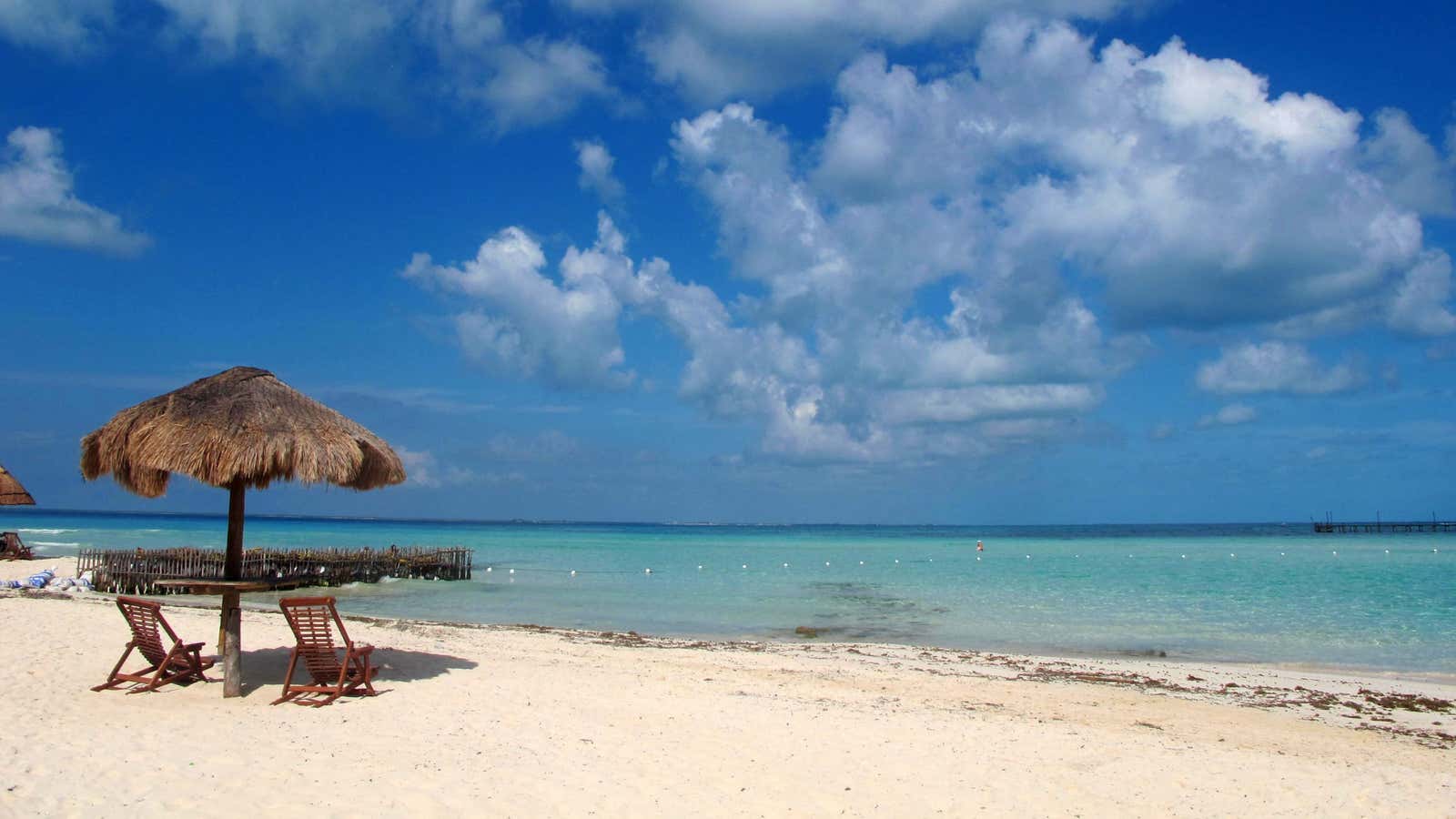Last week, the public was transfixed by the disastrous spectacle of the Fyre Festival. The music festival’s organizers had billed it a luxurious getaway on an island in the Bahamas, featuring models, yachts, massages, a pig roast, and other Instagram-friendly sights. Instead, attendees found themselves stranded on an island without reliable sources of food, water, shelter, and other basic necessities.
It’s hard to imagine an event that better showcases the duality of islands in the popular imagination. On one hand, people frequently imagine visits to islands as accessing a kind of paradise—from the Puerto Rican island of Vieques, where wild horses roam and the full moon shines over a bioluminescent bay, to the whitewashed houses and electric-blue waters of Santorini. Historically, people have often associated islands with pilgrimage or spiritual travel, offering visitors an escape from their materialistic everyday lives that leads to fresh revelations. Christians flocked to the Scottish island of Iona to stay at its storied monastery in the early Middle Ages. In the 1800s, the marvelous isolation of the Galapagos Islands led Charles Darwin to create his theory of evolution.
But the idea that islands are places where one can find a personal utopia has a clear dark side, as evident in the violent history of colonialism. And islands in the popular imagination can also be places of loneliness and anarchy—even a metaphor for hell. The beauty of traveling to an island is the same thing that makes it terrifying: Once you’re on it, you can feel quite far away from everything else.
For the rich, islands today hold particular appeal. With the advent of air travel, it is possible to dash off to St. Barts, Ibiza, or Bali for a quick jaunt without sacrificing the conveniences of mainland living. And of course, owning your own private island has emerged as an elite status symbol—a place where VIPs like Richard Branson and Leonardo DiCaprio can fashion worlds designed precisely to their liking.
“You can own this little piece of the world,” Chris Krolow, host of HGTV’s Island Hunters and the founder and CEO of Private Islands Inc., told The Atlantic in 2015. “It’s the closest you can get to having your own kingdom.”
Since islands are surrounded by water, they’re inherently exclusive—a geographic feature that may give the wealthy a feeling of control over their surroundings. And thanks to the availability of the internet, cell phones, and other modern communications, the very thing that made islands foreboding in the past—their isolation—is now central to their appeal. Whereas societies once shipped prisoners off to islands as punishment, now the privileged choose to isolate themselves, expecting to be able to get back in touch (and back on the mainland) whenever they want. As Ben Myers wrote for the Guardian in 2011, “now that nowhere in the world is beyond reach, the solitude of island living becomes a prized commodity.”
Artists have also often long turned to islands for creative inspiration. For the 19th-century French painter Paul Gauguin—whose paintings have since been criticized for reflecting racist, sexist, and colonialist views—Tahiti offered an escape from his life in Europe, characterized by illness, poverty, and bureaucracy. Capri, off the Italian coast near Naples and a popular 19th-century stopover on the grand tours across Italy and Greece, has a long history of attracting artists, intellectuals and writers. In the 20th century, Capri became the hub for fashionable parties and social events where the rich and famous came together. The Swedish doctor and writer Axel Munthe made the island his new home; his Villa San Michele is still open to visitors today. Also among the expats of this island were lesbian women and gay men, for whom the more relaxed Mediterranean lifestyle represented an escape from the more conservative and even intolerant societies of northern and central Europe.
Fyre Festival played on these associations by promising access to models, musicians, and celebrities, with the underlying implication that a luxury getaway in the Bahamas was also a spiritual quest. “Come, seek, for searching is the foundation of fortune,” the festival’s tagline promised. But islands do not exist solely for the pleasure of the traveler—as the festival-goers were soon to find out.
The ABC series Lost, set on a remote tropical island, got a lot of mileage out of contrasting the island’s picturesque setting with the death and danger faced by its band of airplane crash survivors. In the classic 1954 novel Lord of the Flies, a group of children try to build a society on an uninhabited island and descend into chaos. The success of these stories testifies to the enduring appeal of Daniel Defoe’s archetypal novel Robinson Crusoe, about a man who finds himself on what at first seems to be a deserted island after a shipwreck, and confronts the challenge to figure out an entirely new life for himself under adverse circumstances.
I’ve gone from paradise to purgatory while visiting an island myself. While vacationing in Dominica, the island between Guadeloupe and Martinique, I got lost in the jungle at night for about 12 hours, facing strong rainfall, no public transportation, and no easy way out. I managed to get away in the end—by pure chance, I spotted a truck and managed to squeeze myself in the middle of a large group of banana plantation workers. The experience reminded me that, for an outsider, the reality of an island can be quite different from its place in one’s imagination.
This ambivalence towards islands was captured magnificently by Judith Schalansky in her book Atlas of Remote Islands. The writer and designer collected historic and scientific events related to 50 islands she has never visited, and included them on intricately designed maps. Armchair travelers are left to wonder how often-incredible stories of voluntary and involuntary Swiss Family Robinsons could have happened on such tiny, topographical dots. Paging through the book is a reminder of an important rule of thumb: For travelers, many places appear most alluring when admired from a distance.
